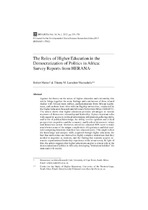The roles of higher education in the democratization of politics in Africa: survey reports from HERANA
Abstract
Against the theory on the nexus of higher education and citizenship, this
article brings together the main findings and conclusions of three related
studies with African mass publics, parliamentarians from African legislatures,
and students from three African flagship universities, conducted by
the Higher Education Research and Advocacy Network in Africa (HERANA).
The article shows that higher education provides advantages in various
measures of democratic citizenship and leadership. It plays important roles
with regard to access to political information, information gathering skills,
and levels of political knowledge; the ability to offer opinions and critical
perspectives on politics and the economy; and levels of democratic values
and democratic action. Moreover, university-educated MPs seem to make
much better sense of the unique complexities of legislatures and their multiple
competing functions than their less educated peers. This might reflect
the knowledge and analytic skills acquired through higher education, the
fact that universities are themselves highly complex institutions that they
needed to negotiate as students, and the finding that students acquire extensive
organisational leadership experience while at university. In light of
this, the article suggests that higher education can play a crucial role in the
democratisation of politics in Africa by developing “institution-builders” for
state and civil society.

